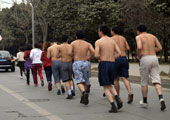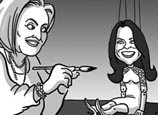
In January, the railway system completed investments worth 20.9 billion yuan, 70 percent more than at the same time last year.
Also, in a further sign of a credit-backed investment boom, many provinces have set high annual investment growth targets for this year, with some of them at 30 percent or even higher.
"Supported by credit extension, particularly in the non-banking sectors, China's GDP growth will likely be comfortably in the range between 7.5 and 8.5 percent in 2013, stronger than the 7.8 percent seen in 2012," Moody's Investor's Service said in a recent report.
However, Moody's warned that risk may emerge if non-banking credit growth is left unchecked, or regulators are unable to adequately manage the associated risks, which could result in negative impact on the country's economic stability.
Standard & Poor's Ratings Services also cautioned about possible over-investment led by the credit expansion.
"China's heavy dependence on fixed capital-led growth magnifies its economic sensitivity to a correction in investments," said S&P credit analyst Terry Chan.
"As fixed capital becomes less productive, the high growth rates of investment in China may be harder to sustain. Such a potential drop could have a significant impact on China's GDP growth," Chan added.
Chu Jianfang, chief economist with Citic Securities, said the larger-than-expected new financing in January was partly a seasonal result of Spring Festival, and was also caused by the lower interest rates amid an easing environment.
The inter-bank borrowing rate, a benchmark interest rate, was at 2.27 percent in January, 0.34 percentage points lower than in the previous month.
If the fast-growing credit supply momentum is maintained, the expanding total new financing will result in the economy overheating, Chu said.
"We estimate that the government will adopt tougher controls on new financing," he added.
On Thursday, the central bank launched measures to withdraw liquidity from the market - for the first time in eight months - raising speculation that it will tighten credit supply.
"Considering the inflationary pressure and the rebound in housing prices, we don't expect the easing environment to last for long, and the policy stance will be more stringent in the future," Chu said.

















 At 75, he travelled in Europe; at 98, he got a master's degree; at 102, he published an autobiography.
At 75, he travelled in Europe; at 98, he got a master's degree; at 102, he published an autobiography.


![]()
